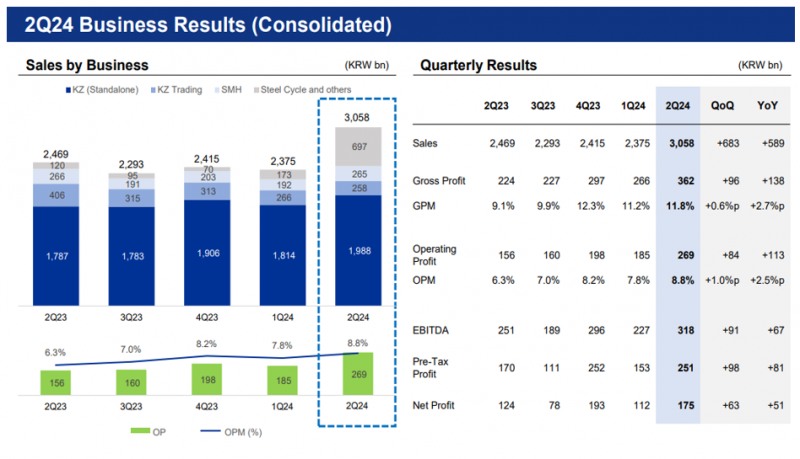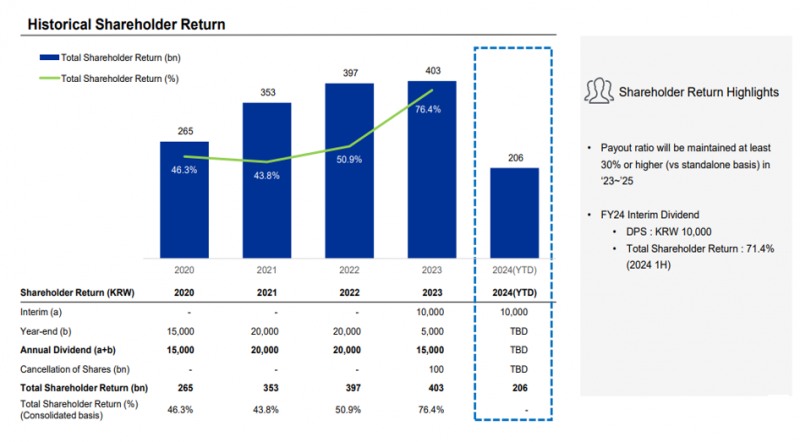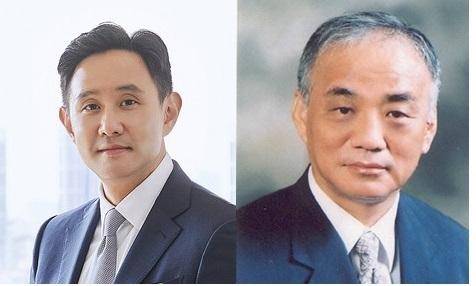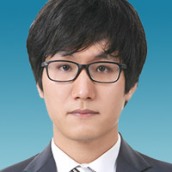The company's sales and operating profit forecast for the 3rd quarter, as compiled by FnGuide on Sept. 9, is KRW 3.192 trillion and KRW 265 billion. The company is expected to post sales of KRW 3.225 trillion and operating profit of KRW 265 billion in the 4th quarter. The consolidated operating profit forecast for the second half of the year is 17% higher than the first half of the year and 48% higher than the first half of last year.
Although the prices of non-ferrous metals have been falling recently due to recessionary concerns, the outlook for the company's performance in the second half of the year is positive as gold and silver prices are expected to strengthen in addition to expectations of interest rate cuts in the US.
“Given the economic slowdown concerns, interest rate cut expectations, and unstable international situation, the company will continue to benefit from stronger precious metal prices in the 2nd half of the year,” said Lee Jae-gwang, a researcher at NH Investment & Securities, in a report on Korea Zinc.
 이미지 확대보기
이미지 확대보기As the company's performance has been on the upswing, it has also been materializing its shareholder return plan.
At the same time, the company said it has approved a plan to buy back 400 billion won of its own shares. The reason for the purchase is to enhance shareholder value, including incineration, and the scale of incineration will be disclosed again when it is implemented until May next year.
Previously, the company had decided to buy back KRW 150 billion of its own shares in May. In November last year, it also announced a plan to buy back KRW 100 billion of its own shares, which it burned in May this year.
 이미지 확대보기
이미지 확대보기The reason why the company favors share buybacks over dividends as a way to return to shareholders is related to the company's shareholding structure.
Korea Zinc is a family of the Youngpung Group, which was co-founded in 1949 by founders Jang Byung-hee and Choi Ki-ho. Recently, Choi Yoon-beom, the 3rd generation of Korea Zinc, has moved to separate the affiliates and is at odds with the Jang family.
The largest shareholder of Korea Zinc is Youngpung, which holds 25.4%. Including this, the Jang family owns 32% of the company. The larger the dividend, the greater the benefit to the Jang family.
While the personal shareholding of the current executive chairman, Choi Yoon-beom, is low at 1.84%, the favorable shareholding of related parties is estimated to be over 33%. In particular, Choi's camp has used domestic companies such as LG, Hanwha, and Hyundai Motor Group as allies to raise their shareholdings. In the process, he also utilized treasury shares purchased in the past.
 이미지 확대보기
이미지 확대보기The conflict between the two families is ongoing. In April, Korea Zinc decided not to renew its 20-year contract with Youngpung to handle sulfuric acid, and in June, Youngpung responded with a lawsuit.
If Korea Zinc continues to perform above expectations under Choi Yoon-beom, the remaining shareholders are likely to support the current management. In fact, the National Pension Service, the second largest shareholder with a 7.8% stake in Korea Zinc, also voted for the agenda posted by the management at this year's general shareholders' meeting where the two families competed.
Gwak Horyung (horr@fntimes.com)
가장 핫한 경제 소식! 한국금융신문의 ‘추천뉴스’를 받아보세요~
데일리 금융경제뉴스 Copyright ⓒ 한국금융신문 & FNTIMES.com
저작권법에 의거 상업적 목적의 무단 전재, 복사, 배포 금지

















![투자 부담 떠안은 한화오션 장연성, '재무 안정' 시험대 [나는 CFO다]](https://cfnimage.commutil.kr/phpwas/restmb_setimgmake.php?pp=006&w=284&h=214&m=5&simg=20260211140512036600d260cda7511817679169.jpg&nmt=18)





![투자 부담 떠안은 한화오션 장연성, '재무 안정' 시험대 [나는 CFO다]](https://cfnimage.commutil.kr/phpwas/restmb_setimgmake.php?pp=006&w=110&h=79&m=5&simg=20260211140512036600d260cda7511817679169.jpg&nmt=18)